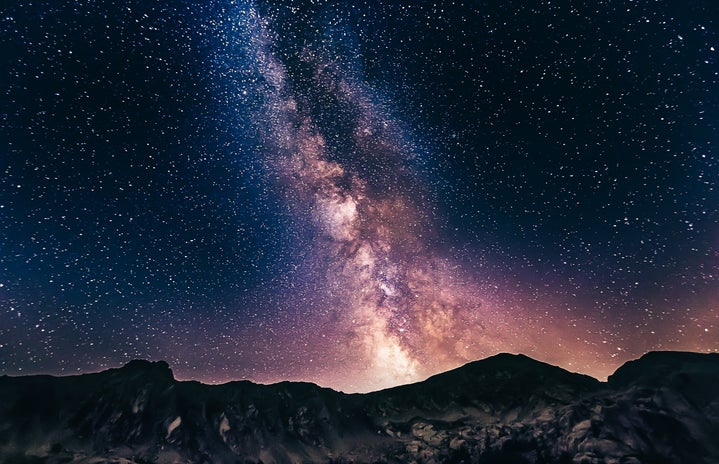One warm, summer night at the end of July, I found myself in the same place I spent most other summer nights: in my best friend’s apartment, sitting at the kitchen table, eating Chinese food, while YouTube videos played on the TV behind us.
This particular night, we chose to venture down a rabbit hole of videos about aliens, extraterrestrial life, and what it might mean if alien UFOs and their pilots are real.
My friend decided to show me a video about a hypothesis I hadn’t heard of until then: the Great Filter. Essentially, the hypothesis holds that there is a filter that a civilization or species will either pass or get stuck at. If the species gets stuck at the filter, they will likely not ever pass it, and will eventually be wiped out…. encouraging, right?
Kurzgesagt explains it much better than I can, here, but to put it briefly there are two possible scenarios involving the Great Filter and our society:
- The filter is already behind us, and we’ve passed a unique checkpoint that allowed us to continue past the barrier. This would mean that we are the most, maybe the only, intelligent lifeforms in the universe.
- The filter is ahead of us. This would mean that unlike other hypothetical lifeforms that may have existed at one time or another, our human society has persevered through numerous catastrophes, and will probably continue to do so. Kurzgesagt says that in this scenario, the “great” filter, can simply become a mountable hurdle.
However, it’s possible that this scenario is the one we’re living in, and we’re creating an insurmountable hurdle by destroying our own inevitable destruction (read: creating irreversible climate damage).
If aliens are real, and they’ve begun to make – distant – contact with us by piloting around our skies, this would suggest that they have surpassed the Great Filter. It would mean we are not the only intelligent lifeforms here, and it would mean they have achieved something we haven’t yet: universal colonization. The Great Filter suggests that if this is the case, then humans are – to put it dramatically – doomed.
Regardless of whether you believe in the Great Filter hypothesis, or any number of other hypotheses of how humanity will or won’t survive, something we can all agree on is that each of our individual lives will inevitably come to an end.
After the Great Filter video ended, I was sitting on the couch in tears.
Throughout the video, all I could think was, “One day, this will all be gone. Life will be over, and eventually no one will be here anymore. And I’m spending every day studying to go into a career that I don’t feel passionate about.”
I explained this to my friend, who was oddly unfazed by me sobbing on his couch.
“I feel like I’m wasting time,” I said through sniffles.
He asked me what I meant, and I told him how through all of my volunteer experiences and research hours, I hadn’t felt like I was doing what I was meant to do. I spent my free time trying to determine which medical specialties I could pursue so as to maximize the time I had to spend on things I actually want to do. Writing, traveling, trying odd jobs and picking up new skills.
“I’m wasting my time doing something I don’t want to do anymore, but I can’t change majors now, can I?” I asked, rhetorically. This wasn’t a new feeling; I think the pandemic had really made me reflect on what I truly wanted out of life. And I didn’t feel like what I was doing, was that.
“My parents would be so disappointed in me.” I sniffled.
And then he gave me some advice that resonated with me, and which I’ve thought about frequently since that night.
“Okay well, ask yourself this,” he said:
“1. Will this decision hurt anyone – yourself included?
2. Will it make you happy?
3. Will you regret it?”
I thought about it, and I chuckled as tears continued to fall; I could see myself doing all those things: writing, travelling, doing little things that make me feel full of purpose.
“No… yes… and, definitely not.” I smiled.
My friend smiled back at me and said, “Well then you know what to do.”
We followed up the Great Filter video by watching another Kurzgesagt video, called Optimistic Nihilism. It lightened the mood and made me feel even more encouraged to change my major and start pursuing the things that genuinely invigorate me, that I’m passionate about, and which I feel like I’m meant to do. In short, optimistic nihilism is the mindset that since nothing really matters (nihilism, in a nutshell), we might as well do the things we truly want. So long as those things aren’t detrimental to our own well-being or that of those around us.
Nothing matters in the end, so why not do the things that bring us joy?
So, I changed my major days before the fall semester started. I am now a psychology major, and I am happy to report that I feel so proud of myself for listening to my heart and pursuing what excites me.
My post-grad plans are uncertain, I don’t know exactly what I’m doing, and everything is new. But it’s exciting, I love not knowing exactly what I’m doing, and most importantly, it makes me feel like I’m making the most out of the time I do have here. I feel like I’m finding out my reason for Being. Sure, nothing matters in the end, so I could have kept on keeping on, and become a rich doctor. But I wouldn’t be happy. If nothing matters in the end of everything, I’d like to at least have enjoyed the in between.
So, there you have it. How aliens – or the possibility of their existence, really – are what it took to push me to take a leap of faith, and pursue something new.


